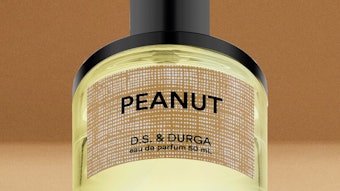- The roles of fragrances in beauty products is multi-fold, helping entice in retail environments, engage during use, foster brand loyalty and more.
- Integrated, diversified consumer offerings with complementary products presented under a distinctive brand umbrella are a fact of life in beauty. That’s why it is key to focus beyond individual products to the brand level, creating a signature style that can be adapted for all products and variants under the brand profile.
Our sense of smell is one of our strongest senses, capable of discerning thousands of different olfactory notes across multiple scent categories. That’s impressive. But where our olfactory sense really shows its power is detecting tiny amounts of scent—in dilutions of less than one part in several billion, according to researchers.
For beauty and cosmetic designers using fragrance at lower use levels in products such as blush, foundation and lipstick, that’s an important factor. But for all other beauty products, our sense of smell is more than just a factor: it’s the direct route to our emotions. Put simply, our sense of smell is how we fall in love with products. Nothing connects faster to our feelings than fragrance, and nothing generates a greater emotional response. Managing beauty brands today means being smart about how fragrance works.
And while that’s something you’d expect a perfumer to say, it’s not industry professionals who are driving the passion for fragrance—it’s consumers. Never in history have consumers been more fragrance savvy (they’ve been “trained” by marketers and retailers); never have expectations been greater for beautiful fragrances in every brand; and never has more attention been paid to sensory messaging by companies such as Procter & Gamble, Unilever and L’Oréal.
Today, if a scent does not connect with consumers, or fails to motivate and inspire, the product and the brand likely will not survive. Making a better future happen means understanding the role of fragrance in product design and how fragrance planning should be undertaken.
Beauty Is Fragrance
The best way to think about fragrance is first to think of scent as a beauty brand’s primary consumer connection. Before we buy a fragranced product, we always smell the scent. If we don’t like what we smell, everything stops there. That’s how critical a winning fragrance is for marketers and consumers.
Second, for many—if not most—beauty products, a beautiful scent is a huge part of the consumer’s user experience. As we wash, shower, shave or care for our skin and hair, we experience a fragrance that we decided to make part of our lives. It’s a very intimate, emotional relationship. And that’s the heart of brand loyalty.
Third, while we may not realize it, a creative perfumer has already made sure the fragrance we love reinforces the brand’s image and identity, promotes product functionality and performance promises, and is perfectly aligned with everything about the brand, including its heritage, story and place in the world. More than just a scent, fragrance is a multi-role player in the reality of beauty brands and their relationships with consumers.
Creating a Winning Franchise Fragrance
Today, integrated, diversified consumer offerings with complementary products presented under a distinctive brand umbrella are a fact of life in beauty and personal care. That’s why smart fragrance designers focus not only on individual products but also at the brand level, creating a signature style that can be adapted for all products and variants under the brand profile.
The original signature fragrance will have a clearly defined identity, carefully selected notes and accords, and a style that not only fits the brand’s identity and competitive positioning but also enhances the brand’s role in the consumer’s life.
Next, the fragrance signature will be modified to fit individual products, formats and applications—extending the desired emotional experience from the body wash, for example, to the facial scrub, hand and body lotion, shampoo and conditioner, and face lotion, linking the fragrance to the intimacy and functionality of each product.
Developing signature concepts, perfumers study consumers’ tastes and preferences, conceptualize user experiences, and draw on different fragrance notes to make the experiences real and memorable. The outcome is a compelling fragrance design that unifies the lineup, creates and reinforces brand identity, and gives the consumer multiple reasons to say yes.
A successful franchise fragrance is a series of complementary and supportive scents sharing a singular identity, each totally aligned with the product and brand. And because this new fragrance drives purchasing decisions across the business, it’s more than just a beautiful olfactory event. It’s a brand asset that has enormous value.
Building Competitiveness in Private Label Brands
In multiple retail categories, including beauty, private label is changing. That’s because the opportunity today isn’t to compete on price, with minimal product design and appealing only to the low end of the market. The real opportunity—which offers significant opportunities for margins and profits—is to swim in the mainstream, compete aggressively against national brands and build destination brands that bring shoppers into the store. Consumers can then bond strongly to fragrance experiences they love and share that love with friends. This creates lifetime loyalty, repeat purchase and consumer buzz.
The opportunity is less challenging than it seems; what it takes is a commitment to intelligent planning, competitive design factors and, above all, winning fragrances.
Again, the driver here is the consumer. Today’s consumers are very open and receptive to private label brands, but they also want everything they get a brand products in private label offerings and see no reason to compromise or expect less. The success of major destination store brands in retailers like Walmart, Walgreens and Target proves the point. Consumers respond enthusiastically to the right technologies, the right ingredients, multiple performance promises, earth-friendly packaging and fragrances that connect instantly in the store, when the product is first sensed by the consumer, and then create beautiful, fragrant user experiences at home.
In fact, fragrance development is probably the most cost-effective way to enhance the performance profile of a private label brand. Smart perfumers approach private label opportunities the same way they do for brand leaders, creating new fragrance profiles that have the power to compete and win. Sensitive to the economics of marketing, perfumers also manage fragrance formulas to deliver the right fragrance effect at the right strength at the right cost.
Rethinking private label strategies and fragrances can be a life-changing event for a beauty brand. Major retailers have already learned the lessons: many now drive decision making by advising manufacturers on exactly what they want to achieve—and exactly what they need on their shelves—in order to compete successfully for the shopper’s loyalty and enhance corporate performance in categories that matter.
Lori Miller Burns is director of marketing at Arylessence. An experienced consumer products marketer, she has special expertise in consumer insights, trends and behaviors that help perfumers to develop competitive fragrances and clients to create winning brands. She worked as a marketing executive for some of the best-known and most innovative brands in America, including Clinique, Aveda and The Body Shop, where her experience included new product development, fragrance introductions, and consumer marketing. At Arylessence, Miller Burns publishes the Arylessence TrendWatch, a comprehensive review of trends that define the American consumer and provide new directions for product development, fragrance design and marketing. She leads a marketing team that develops special insights into products, packaging and colors that are setting new trends in consumer packaged goods, fashion, product design, home décor and furnishings.










